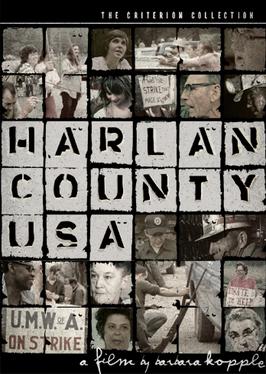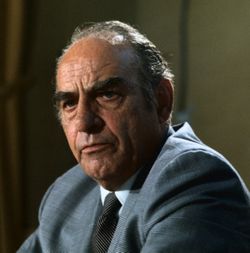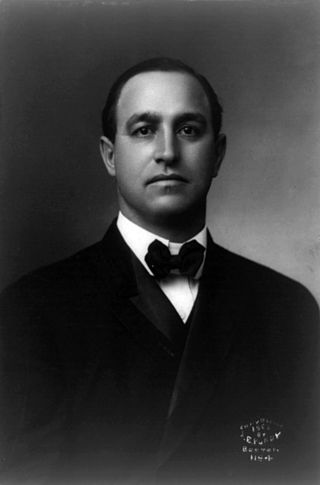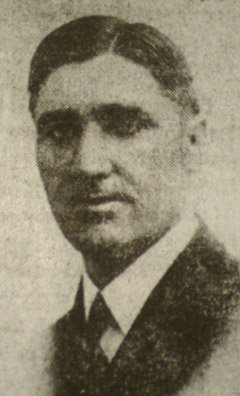Related Research Articles

John Llewellyn Lewis was an American leader of organized labor who served as president of the United Mine Workers of America (UMW) from 1920 to 1960. A major player in the history of coal mining, he was the driving force behind the founding of the Congress of Industrial Organizations (CIO), which established the United Steel Workers of America and helped organize millions of other industrial workers in the 1930s, during the Great Depression. After resigning as head of the CIO in 1941, thus keeping his promise of resignation if President Franklin Delano Roosevelt won the 1940 election against Wendell Willkie, Lewis took the United Mine Workers out of the CIO in 1942 and in 1944 took the union into the American Federation of Labor (AFL).

The United Mine Workers of America is a North American labor union best known for representing coal miners. Today, the Union also represents health care workers, truck drivers, manufacturing workers and public employees in the United States and Canada. Although its main focus has always been on workers and their rights, the UMW of today also advocates for better roads, schools, and universal health care. By 2014, coal mining had largely shifted to open pit mines in Wyoming, and there were only 60,000 active coal miners. The UMW was left with 35,000 members, of whom 20,000 were coal miners, chiefly in underground mines in Kentucky and West Virginia. However it was responsible for pensions and medical benefits for 40,000 retired miners, and for 50,000 spouses and dependents.

The Communist Party USA and its allies played an important role in the United States labor movement, particularly in the 1930s and 1940s, but wasn't successful either in bringing the labor movement around to its agenda of fighting for socialism and full workers' control over industry, or in converting their influence in any particular union into membership gains for the Party. The CP has had only negligible influence in labor since its supporters' defeat in internal union political battles in the aftermath of World War II and the CIO's expulsion of the unions in which they held the most influence in 1950. After the expulsion of the Communists, organized labor in the United States began a steady decline.

Harlan County, USA is a 1976 American documentary film covering the "Brookside Strike", a 1973 effort of 180 coal miners and their wives against the Duke Power Company-owned Eastover Coal Company's Brookside Mine and Prep Plant in Harlan County, southeast Kentucky. It won the Academy Award for Best Documentary at the 49th Academy Awards.

The Coal strike of 1902 was a strike by the United Mine Workers of America in the anthracite coalfields of eastern Pennsylvania. Miners struck for higher wages, shorter workdays, and the recognition of their union. The strike threatened to shut down the winter fuel supply to major American cities. At that time, residences were typically heated with anthracite or "hard" coal, which produces higher heat value and less smoke than "soft" or bituminous coal.

Joseph Albert "Jock" Yablonski was an American labor leader in the United Mine Workers in the 1950s and 1960s known for seeking reform in the union and better working conditions for miners. In 1969 he challenged Tony Boyle for the presidency of the international union and was defeated. He asked for a Department of Labor (DOL) investigation, charging a fraudulent election. In addition, Yablonski filed lawsuit against the UMWA on five different charges related to fraud. On New Year's Eve, Yablonski, his wife, and 25-year-old daughter were murdered, fatally shot at home by three gunmen found to have been hired on orders of Tony Boyle.
William Anthony "Tough Tony" Boyle was an American miner, union leader, and convicted murder-for-hire conspirator. He became president of the United Mine Workers of America union in 1963, serving until 1972. Boyle was convicted in 1974 of charges of conspiracy in the murder of opponent Joseph A. Yablonski, Yablonski's wife Margaret, and their daughter Charlotte, on New Year's Eve, December 31, 1969. After an appeal, his conviction and sentence were upheld at a second trial; he was sentenced to three life terms and died while still incarcerated.

The Harlan County War, or Bloody Harlan, was a series of coal industry skirmishes, executions, bombings and strikes that took place in Harlan County, Kentucky, during the 1930s. The incidents involved coal miners and union organizers on one side and coal firms and law enforcement officials on the other. The Harlan County coal miners campaigned and fought to organize their workplaces and better their wages and working conditions. It was a nearly decade-long conflict, lasting from 1931 to 1939. Before its conclusion, an unknown number of miners, deputies and bosses would be killed, state and federal troops would occupy the county more than half a dozen times, two acclaimed folk singers would emerge, union membership would oscillate wildly and workers in the nation's most anti-labor coal county would ultimately be represented by a union.
The Progressive Miners of America was a coal miners' union organized in 1932 in downstate Illinois. It was formed in response to a 1932 contract proposal negotiated by United Mine Workers President John L. Lewis, which reduced wages from a previous rate of $6.10 per day to $5.00 per day.
The Bituminous coal strike of 1974 was a 28-day national coal strike in the United States led by the United Mine Workers of America. It is generally considered a successful strike by the union.
The Bituminous coal strike of 1977–1978 was a 110-day national coal strike in the United States led by the United Mine Workers of America. It began December 6, 1977, and ended on March 19, 1978. It is generally considered a successful union strike, although the contract was not beneficial to union members.
Arnold Ray Miller was a miner and labor activist who served as president of the United Mine Workers of America (UMWA), AFL–CIO, from 1972 to 1979. Winning as a reform candidate, he gained positive changes for the miners, including compensation for black lung disease. He had difficulty dealing with growing internal union opposition. His last two years as president were particularly tumultuous and he suffered two heart attacks, finally resigning in November 1979 with the title of "president emeritus for life".
Kenneth Yablonski was a noted attorney with the firm of Yablonski, Costello and Leckie in Washington, Pennsylvania.
Mike Trbovich was a miner and labor union activist in the United Mine Workers of America, AFL-CIO, in the 1960s and 1970s. He was elected as vice president of UMWA in 1972, serving under Arnold Miller until 1977.
Samuel Morgan Church, Jr. was a coal miner and president of the United Mine Workers of America (UMWA) from 1979 to 1982.

John Mitchell was a United States labor leader and president of the United Mine Workers of America from 1898 to 1908.

Adoph F. Germer was an American socialist political functionary and union organizer. He is best remembered as National Executive Secretary of the Socialist Party of America from 1916 to 1919. It was during this period that the Left Wing Section of the Socialist Party emerged as an organized faction. Germer was instrumental as one of the leaders of the SPA's "Regular" faction in orchestrating a series of suspensions, expulsions, and "reorganizations" of various Left Wing states, branches, and locals and thereby controlling the pivotal 1919 Emergency National Convention of the SPA, and thus forcing the Left Wing to establish new organizations of their own, the Communist Labor Party of America and the Communist Party of America.

The Illinois coal wars, also known as the Illinois mine wars and several other names, were a series of labor disputes between 1898 and 1900 in central and southern Illinois.
Guy Otto Farmer was an American lawyer and civil servant. He was Chairman of the United States National Labor Relations Board from July 1953 to August 1955. After leaving government service, he represented the Bituminous Coal Operators Association, the collective bargaining arm of the bituminous coal mining industry in the United States.
Miners for Democracy was a dissident movement within the United Mine Workers of America which created successful reform in the union's administration of the union in the early 1970s. It was organized in Clarksville, Pennsylvania in April 1970 after the funeral of Joseph ‘‘Jock’’ Yablonski, after the current president hired assassins for his murder. MFD formed with the mission to challenge the UMWA's current administration, decentralize the union and bring power back to the rank-and-file miners. MFD worked closely with the Black Lung Association (BLA), who also openly opposed the Boyle administration. BLA formed in 1969 led by Arnold Miller and Charles Brooks, and Miller would later be chosen by MFD as a candidate to replace Boyle as president during union reform. Mike Trbovish, who was chairman of MFD, became the vice president of the union under the Miller administration.
References
- ↑ These charges and their resolution are outlined in Kenneth J. Yablonski and Joseph A. Yablonski v. United Mine Workers of America et al., 466 F.2d 424 (August 3, 1972).
- 1 2 Yablonski, J. (1976). In: B. Kopple (dir.). Harlan County U.S.A..
- Brown, Warren. "UMW Bank Sale: Poetic Justice." Washington Post. March 6, 1985.
- Dine, Philip. "UAW's Tucker: Losing Militant is Facing Ouster From Post." St. Louis Post-Dispatch. May 21, 1989.
- "The Fall of Tony Boyle." Time. September 17, 1973.
- Mortensen, Chris. "NFL Owners Better Settle Up or Look Out." The Sporting News. March 23, 1992.